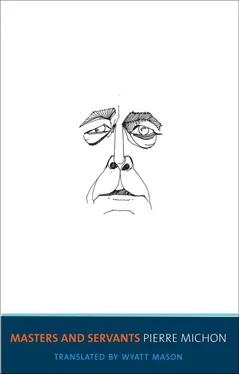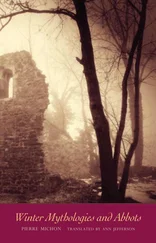ARE THESE FALCONS YOU’RE loosing, my sweets? Just so. They are our hunters when we can no longer see. It won’t be honey they’ll sew into the loins of rabbits, of hoopoes — O enough little songs! Birds both beautiful and large that sing to mate and that stink, they too, the unfortunates. You understand these hoopoes, don’t you, Hakem? No one eats them, but… You’re not talking. Hard at it, then, my sweets! You see nothing, but you don’t need eyes to kill: our falcons see for us, are our eyes and our beaks that by some marvel flow away from us when we remove their cowls. They return full of blood, with feathers barely still. Quails? Something else? Come, the duke will be content, he will have hazel grouse on his table tonight. And I will have his wife. I will dry my gear, have a drink, another, will go tranquilly to her room and plunge into his bowl of milk. How everything is simple and dark beyond this milk.
There is nothing in the woods. You know well, my little partridges, nothing but meat. Perhaps that is why at night you swim deep into your wine casks to drown. Not the best of lives but, after all, it makes good hunters, right? What comes over you, now and again, on beautiful days? Your heads tilt back, you fall still, a hare slips your grip, a hatchet dangles from your fingertips, a musket falls, and your horse senses that he too can relax, can breathe the air, your weight on him has changed, no longer are you this tensed pile of meat that has always terrified him, whose dark black weight he’s been lugging around, no, the darkness has departed and you are light, you look at the magic dust that the sun sprinkles into the glade, you stop in its midst and remain there, it warms you, and not only your body — what has come over you? Are you listening to that cavalry on high? Is it hunting your little soul, carrying it off, tending it gently? You lift your head higher, it’s all too blue, you can’t see anything anyway; but even the ferns seem greener — and your faces, my princes, are they the same? It’s only wind. It leaves quickly, you are gone with your mount, all the weight of darkness drills a huge hole in the brush, and in that hole there are only branches that crack, trembling little bones that escape the falcon but crack between the teeth of the fox, and, if the whole world were in your fist, it too would crack just the same. My sweets.
But no magic dust today: only more of this soupy fog that so easily leads to ire, and to those detestable things that storm around us and that we desire. The drops never tire of beating the earth. Curse the world, it will reward you.
The ambition of these few mentions is minor: to catalogue a handful of items sure to elude a good American dictionary or encyclopedia. Noted are a few French phrases and historical references, and one countermea-sure is taken against a potential catastrophe of mistaken identity.
THE LIFE OF JOSEPH ROULIN
Henri Riviere . 1827–1883; French Naval officer, defended Hanoi in 1882.
Le casseur des assiettes . Literally, the plate-breaker; a vendor of china and flatware in a traditional open market who would bark out a sales pitch: “A lovely service for eight! Sixty-four pieces! Just fifteen francs! Buy ’em, or I start breaking ’em!”
Le temps des cerises . Cherry-picking time, a line from a popular song of the period about spring.
Sur le motif . An artists’ term, used to describe the painting of landscapes, or the act of placing an easel in no particular spot and proceeding to paint whatever lies in the distance.
Le Grand Soir , or “Great Eve.” An expression coined by the idealistic members of the post-revolutionary republican proletariat, denoting the eve of the installation of the “true” republic.
As le Grand Soir is the eve, la Sociale is the day.
Antoine Quentin Fouquier-Tinville . 1746–1795; political official, magistrate; condemned men to death by guillotine during the period known as “The Terror.”
Baron Jean Baptiste Anacharsis de Cloots . 1755–1794; founder of anti-clergy movement, “The cult of reason”; guillotined.
GOD IS NEVER THROUGH
The Pardo . As distinct from The Prado. El Pardo Palace is located a few miles outside of Madrid and was built in the sixteenth century by Charles I. The paintings of the King’s Antechamber described in the story were moved many years later to the Prado Museum, located on the Paseo del Prado, in Madrid. The Prado Museum was built in 1820 and was first devoted to Spain’s natural history collections, not to its art.
The Prado mentioned in the story is therefore the boulevard, not the museum. The Pardo, the palace. Viator emptor!
About the Author and the Translator

PIERRE MICHON was born in Creuse, France, in 1945. His first work of fiction was published in 1984, and since that time his reputation as one of the foremost contemporary French writers has become well established. He has won many prizes, including the Prix France Culture for his first book, Small Lives; the Prix Louis Guilloux for the French edition of The Origin of the World; and the Prix de la Ville de Paris in 1996 for his body of work. He has also received the Grand Prix du Roman de l’Académie française for his novel The Eleven , the Grand Prix Société des gens de lettres de France (SGDL) for Lifetime Achievement in 2004, and the Prix Décembre (2002) and Petrarca-Preis (2010).
WYATT MASON, a contributing writer for the New York Times Magazine and a contributing editor at Harper’s , has translated writing by Pierre Michon, Éric Chevillard, Michel de Montaigne, and Arthur Rimbaud. He teaches at Bard College.













